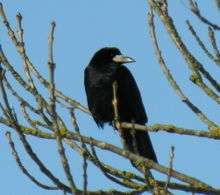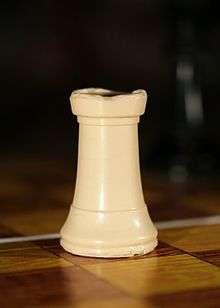rook
English
Pronunciation
- IPA(key): /ɹʊk/
- (obsolete) IPA(key): /ɹuːk/[1]
Audio (US) (file) - Rhymes: -ʊk
Etymology 1

From Middle English rok, roke, from Old English hrōc, from Proto-Germanic *hrōkaz (compare Old Norse hrókr, Saterland Frisian Rouk, Dutch roek, obsolete German Ruch), from Proto-Indo-European *kerk- (“crow, raven”) (compare Old Irish cerc (“hen”), Old Prussian kerko (“loon, diver”), dialectal Bulgarian кро́кон (krókon, “raven”), Ancient Greek κόραξ (kórax, “falcon”), Old Armenian ագռաւ (agṙaw), Avestan 𐬐𐬀𐬵𐬭𐬐𐬀𐬙𐬀𐬝 (kahrkatat̰, “rooster”), Sanskrit कृकर (kṛkara, “rooster”)), Ukrainian крук (kruk, “raven”).
Noun
rook (plural rooks)
- A European bird, Corvus frugilegus, of the crow family.
- Pennant
- The rook […] should be treated as the farmer's friend.
- Pennant
- A cheat or swindler; someone who betrays.
- Wycherley
- I am, like an old rook, who is ruined by gaming, forced to live on the good fortune of the pushing young men.
- Wycherley
- (Britain) A type of firecracker used by farmers to scare birds of the same name.
- A trick-taking game, usually played with a specialized deck of cards.
- A bad deal, a rip-off.
Hypernyms
- (bird): bird
- (firecracker): firecracker
Translations
|
|
See also
Verb
rook (third-person singular simple present rooks, present participle rooking, simple past and past participle rooked)
- (transitive) To cheat or swindle.
- 1974, GB Edwards, The Book of Ebenezer Le Page, New York 2007, p. 311:
- Some had spent a week in Jersey before coming to Guernsey; and, from what Paddy had heard, they really do know how to rook the visitors over there.
- 1974, GB Edwards, The Book of Ebenezer Le Page, New York 2007, p. 311:
Translations
|
|
Etymology 2

From Middle English rook, roke, rok, from Old French roc, ultimately from Persian رخ (rox), from Middle Persian lhw' (rox, “rook, castle (chess)”), possibly from Sanskrit रथ (ratha, “chariot”). Compare roc.
Noun
rook (plural rooks)
- (chess) A piece shaped like a castle tower, that can be moved only up, down, left or right (but not diagonally) or in castling.
- (rare) A castle or other fortification.
Synonyms
- (chesspiece): castle
Translations
|
|
- The translations below need to be checked and inserted above into the appropriate translation tables, removing any numbers. Numbers do not necessarily match those in definitions. See instructions at Wiktionary:Entry layout#Translations.
See also
| Chess pieces in English · chess pieces, chessmen (see also: chess) (layout · text) | |||||
|---|---|---|---|---|---|
| king | queen | castle, rook | bishop | knight | pawn |
Etymology 3
From rookie.
Etymology 4
From Middle English roke, rock, rok (“mist; vapour; drizzle; smoke; fumes”), from Old Norse *rauk, related to Icelandic rok, roka (“whirlwind; seafoam; seaspray”), Middle Dutch rooc, rok, Modern Dutch rook (“smoke; fog”).
Etymology 5
Verb
rook (third-person singular simple present rooks, present participle rooking, simple past and past participle rooked)
Etymology 6
Verb
rook (third-person singular simple present rooks, present participle rooking, simple past and past participle rooked)
- Eye dialect spelling of look.
Dutch
Pronunciation
- IPA(key): /roːk/
- Rhymes: -oːk
audio (file)
Etymology 1
From Middle Dutch rôoc, from Old Dutch *rōk, from Proto-Germanic *raukiz.
Derived terms
Etymology 2
See the etymology of the main entry.